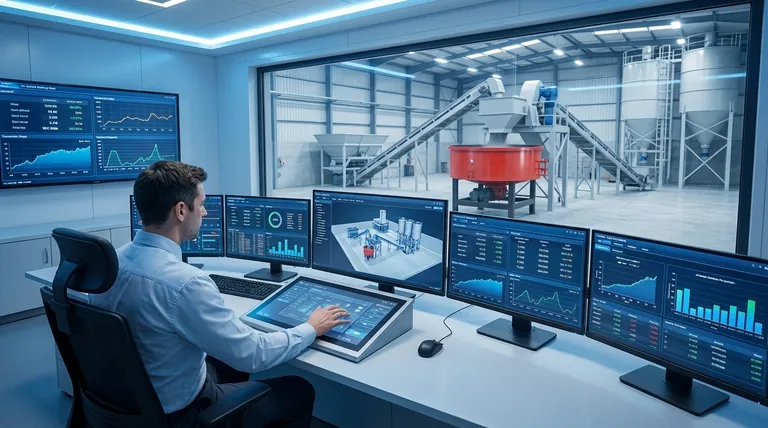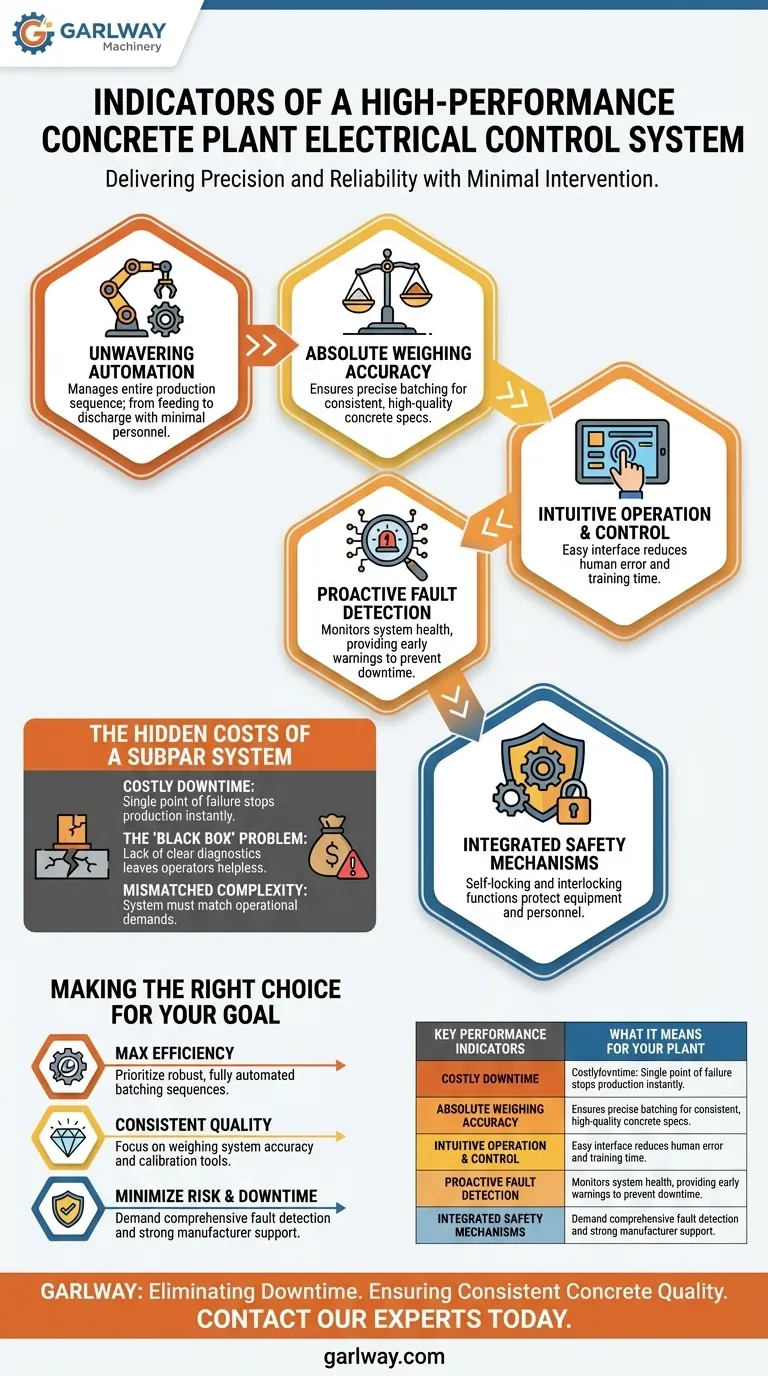A high-performance electrical control system is defined by its ability to deliver precision and reliability with minimal intervention. The clearest indicators of this are its capacity for comprehensive automatic control, highly accurate material weighing, intuitive operator interaction, proactive fault detection, and flexible control over auxiliary systems like lighting. These elements work in concert to ensure the entire plant operates as a seamless, efficient unit.
The control system is the central nervous system of a concrete mixing plant. A superior system is not measured by a list of features, but by its ability to guarantee operational accuracy, eliminate preventable downtime, and reduce the need for constant human oversight.

The Core Pillars of an Excellent Control System
A truly effective control system is more than just a computer and wires; it's the brain that dictates the quality, consistency, and efficiency of your entire operation. Understanding its core functions is key to evaluating its performance.
Unwavering Automation
A top-tier system enables the automatic control of the entire production process.
This means from aggregate feeding to mixing and discharge, the system manages the sequence precisely every time. This level of automation allows a minimal number of on-site personnel to run the entire plant, significantly boosting efficiency.
Absolute Weighing Accuracy
The quality of your concrete is directly tied to the accuracy of your mix.
The control system must allow for precise input of material set points and ensure the weighing system hits those targets without deviation. The ability to easily adjust and modify these values is crucial for producing different concrete specifications.
Intuitive Operation and Control
A complex interface is a liability that invites human error.
The system should be easy to operate, allowing staff to manage production, change formulas, and monitor status without extensive technical training. Clear displays and logical workflows are non-negotiable.
Proactive Fault Detection
A good system doesn't just run; it monitors itself constantly.
It must have robust fault detection and alarm capabilities for common issues. This early warning system for problems with components like PLCs, weighing sensors, or relays is what separates a minor adjustment from a catastrophic, production-halting failure.
Integrated Safety Mechanisms
Protecting your equipment and personnel is a primary function of the control system.
It must include comprehensive self-locking and interlocking functions. This prevents dangerous operations, such as opening an access hatch while the mixer is running, ensuring the system operates reliably and safely.
The Hidden Costs of a Subpar System
Choosing a control system based on price alone is a critical mistake. The long-term consequences of an inadequate system can far outweigh any initial savings, creating significant operational and financial risk.
The Domino Effect of Downtime
The control system is the single point of failure for the entire plant.
If it malfunctions, production stops instantly. Because these systems are often proprietary, users typically cannot perform repairs themselves and must wait for the manufacturer, leading to costly delays and missed deadlines.
The "Black Box" Problem
Many control systems are a "black box" to the end-user.
When a problem occurs, a lack of clear diagnostics leaves operators helpless. A superior system provides transparent reporting and self-diagnostic tools that can help pinpoint an issue, even if a technician is still required for the fix.
Mismatched Complexity
Control systems are not one-size-fits-all.
While a small plant may only need a simple system, installing an under-powered or overly simplified system in a large, high-volume plant is a recipe for disaster. The system's complexity must match the operational demands placed upon it.
Making the Right Choice for Your Goal
Evaluating a control system requires aligning its capabilities with your specific operational priorities.
- If your primary focus is maximum production efficiency: Prioritize a system with robust, fully automated batching sequences and advanced queue management to minimize operator input.
- If your primary focus is consistent, high-spec concrete quality: The weighing system's accuracy, calibration tools, and detailed data logging are your most critical features.
- If your primary focus is minimizing operational risk and downtime: Demand a system with comprehensive fault detection, strong safety interlocks, and proven manufacturer support.
A superior electrical control system is the foundation for a profitable and reliable concrete production operation.
Summary Table:
| Key Performance Indicator | What It Means for Your Plant |
|---|---|
| Unwavering Automation | Manages the entire production sequence, from feeding to discharge, with minimal human intervention. |
| Absolute Weighing Accuracy | Ensures precise material batching for consistent, high-quality concrete every time. |
| Intuitive Operation | Easy-to-use interface reduces training time and minimizes the risk of human error. |
| Proactive Fault Detection | Monitors system health and provides early warnings to prevent costly, unplanned downtime. |
| Integrated Safety Mechanisms | Features like self-locking and interlocking functions protect both personnel and equipment. |
Ready to eliminate downtime and ensure consistent concrete quality?
At GARLWAY, we specialize in engineering high-performance electrical control systems for concrete batching plants. Our systems are designed for construction companies and contractors who demand maximum uptime, precise batching accuracy, and intuitive operation.
Let us help you build a more profitable and reliable operation. Contact our experts today for a consultation on the right control solution for your plant.
Visual Guide

Related Products
- Construction Products Concrete Plant Machine Mixing Concrete Mixer
- HZS75 Concrete Batching Plant Cement Mixer Price Concrete Mixer Bunnings Mixing Plant
- Auto Concrete Cement Mixer Machine New
- JZC1000 Industrial Concrete Mixer Machine Cement Mixer Price
- HZS120 Ready Mix Concrete Batching Plant Commercial Mud Cement Mixer
People Also Ask
- What are the main components of a concrete mixing plant? A Guide to Core Systems & Quality
- What are some innovations in volumetric concrete mixers? Boost Efficiency with On-Demand Production
- What are the characteristics of concrete batch plants? High-Volume, Versatile, and Automated Systems
- What are the two main reasons for a decrease in concrete strength from raw material changes? Ensure Consistent Quality
- What does the mixing host do in a concrete mixing plant? The Heart of Quality Concrete Production
- What environmental benefits do concrete mixing plant containers offer? Achieve Sustainable Construction with On-Site Production
- What should users regularly check to ensure smooth operation of the mixing station? A Proactive Maintenance Guide
- How does the control panel operate in a concrete batching plant? Unlock Precision and Efficiency



















